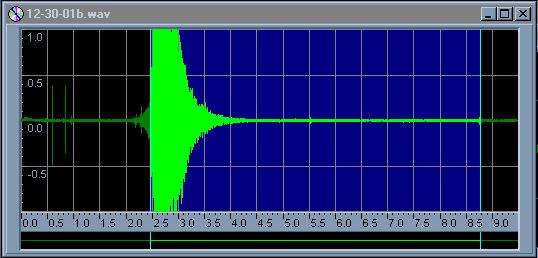| Flying 4x4
Flight 11 12-30-01b |
Return to 4x4 home page |
Details: Spreadsheet output:
| LumberCalc | Version 1d | Data for Flight 12-30-01B | Flying
4x4, flight 7 |
|||
| Measured: | Calculated: | |||||
| Distance * | Feet | Meters | Rise/Run at apogee: | 0.6556 | < ratio of height on pole at apogee / distance to pole | |
| A. Camera to measuring pole | 7.5 | 2.285888 | Rise/Run at burnout: | 0.111107 | < height on pole at burnout / distance to pole | |
| B. Camera to launcher | 217.6 | 66.32124 | ||||
| C. Camera to touchdown | 197.1 | 60.07315 | Height at apogee: | 41.43208 | < distance to apogee * rise/run ratio at apogee | |
| D. Launcher to touchdown | 32.5 | 9.905517 | Height at burnout: | 7.368732 | < distance to burnout * rise/run ratio at burnout | |
| E. Rise on pole at burnout | 0.8333 | 0.253977 | Rise height after burnout: | 34.06335 | < height at apogee - height at burnout | |
| F. Rise on pole at apogee | 4.917 | 1.498628 | ||||
| * Letters A-F refer to drawing on Sheet 2 | Rise time, burnout to apogee: | 2.636608 | < calculated from rise height, deceleration by gravity | |||
| Time, launch to apogee | 3.136608 | < boost time + rise time | ||||
| Time | Seconds | Fall time, apogee to ground | 2.907839 | < calculated from height at apogee & gravity | ||
| Thrust duration | 0.5 | <Note | Total Flight time (calculated) | 6.044447 | < calculated boost + rise + fall time) | |
| Descent from apogee | 3.3 | %Error between flight times: | 0.015562 | < comparing measured vs. calculated times | ||
| Total flight time (measured) | 6.14 | |||||
| Velocity at burnout (m/sec) | 25.83876 | < calculated from rise height, deceleration by gravity | ||||
| Weight | Kilograms | Acceleration, actual (m/s^2) | 51.67753 | < velocity at burnout / thrust duration | ||
| Fuel charge | 0.1207 | Acceleration, felt (m/s^2) | 61.47753 | < actual acceleration + gravity | ||
| Total launch weight | 4.2527 | Thrust (Newtons) | 261.4455 | < felt acceleration * total weight | ||
| Total Impulse (N-Sec) | 130.7227 | < thrust * thrust duration | ||||
| Isp (N-Sec/kg) | 1083.038 | < total impulse / mass of fuel charge | ||||
| Jimmy Yawn | Seconds | 110.5141 | < Isp / gravity | |||
| jyawn@sfcc.net | ||||||
| 12/30/01 | Height (of doubtful accuracy) | 53.361 | < calculated from measured fall time | |||
| >Note: Thrust duration is not certain, audio and video data is ambiguous leading to figures ranging from 0.34 seconds | ||||||
| up to 0.7 seconds. Thus a mid-range value of 0.5 seconds has been used here. |
Click here to download a copy of this spreadsheet, Excel format

Events:
0.6 seconds, Ignition switch clicks
2.4 seconds, Thrust begins
3.0 seconds, burnout
8.8 seconds, vehicle hits ground
Note that the launcher is 217 feet from the camera, causing a delay of about 0.2 second between the visual event and its sound. Thus the ignitor delay is about 2/10 second less than the .wav file would suggest. This ignitor delay is particularly long, probably because the grain was coated with 4 dips in nitrocellulose lacquer and not primed in any way. The first ignitor (copper bridge wire with 1/2 gram black powder wrapped in masking tape) fired but did not ignite the grain. The engine was re-armed by dropping a few large grains black powder (about 1/2 gram) into the core, and pressing them at the head-end with a second ignitor like the first.
JY
12/30/01